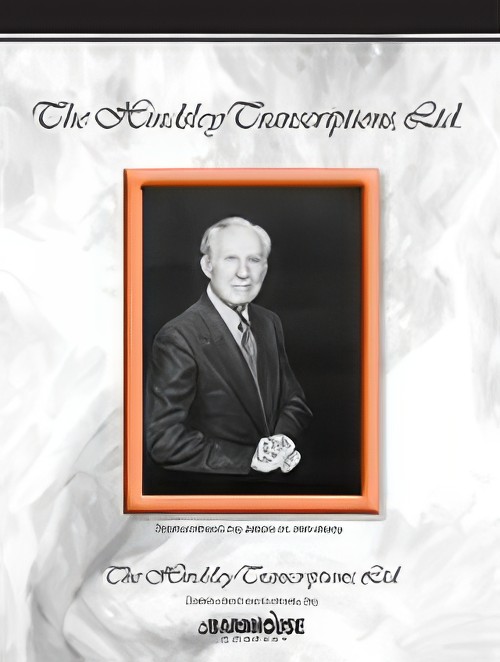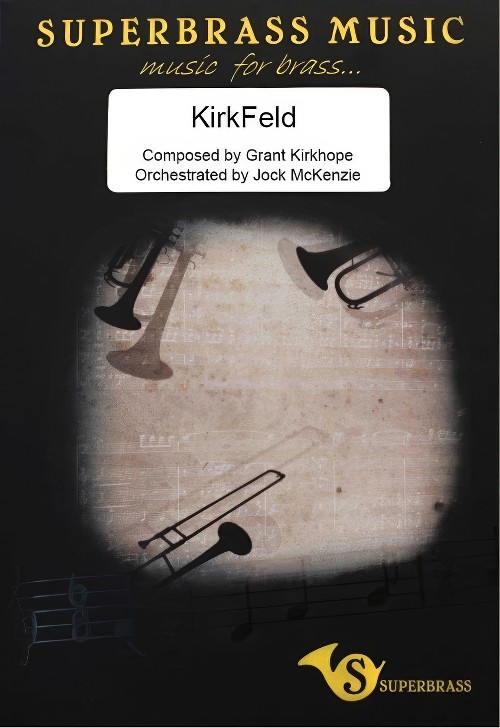Results
-
 £38.00
£38.00Air from D Major Suite (Concert Band - Score and Parts) - Bach, Johann Sebastian - Hindsley, Mark
Duration: 3.00
Estimated dispatch 7-14 working days
-
 £125.00
£125.00KirkFeld (Trombone Solo with Concert Band - Score and Parts) - Kirkhope, Grant - McKenzie, Jock
Written for Ian Bousfield and the International Trombone Festival 2017. Grant Kirkhope is a BAFTA nominated British composer who has created the soundtrack for video games that have sold in excess of 30 million copies. From "GoldenEye" to "Banjo-Kazooie", "Viva Pi?ata" to "Donkey Kong", "Kingdoms of Amalur: Reckoning" to "Civilization: Beyond Earth" and "Perfect Dark" to "Castle of Illusion starring Mickey Mouse". He has also recently scored the feature film "The King's Daughter" starring Pierce Brosnan and William Hurt and is currently working on "Yooka Laylee" and "Dropzone". Grant's score for "Viva Pi?ata" was nominated by BAFTA in the Original Score category in its 2007 awards. Grant is represented by the prestigious Gorfaine/Schwartz Agency by Cheryl Tiano and Kevin Korn. Grant has a degree in music from the Royal Northern College of Music, Manchester, where he majored in classical trumpet, is a green card holder and now lives in Agoura Hills, LA with his wife and two children. "Ian and I first met when we were around 15 years old. We both played in our county orchestra, the North Yorkshire Schools Symphony Orchestra (I was a trumpet player). I think we hit it off straight away, as we were definitely a couple of cheeky kids, if you know what I mean! We both ended up playing in Rowntree Mackintosh Brass Band for a while too which Ian's Dad, Trevor conducted. We bumped into each other again when we both went for the Shell/LSO Scholarship. I got to the area finals in Manchester so I was pretty pleased with myself but then I saw Ian and I knew it was all over! Of course Ian went on to win and the rest is history. I saw him again when I was attending the Royal Northern College of Music around 1983 by which time Ian had just got the principal chair at the Halle Orchestra. Then I guess 30 something years went by as we both went about our lives and lost touch. We re-kindled our friendship due to his wife really. She emailed me to say it was Ian's 50th birthday and she was collecting stories from all his friends over the years. After that we got back in touch and then one day on Facebook I got a message from him in typical dry Yorkshire fashion "now then Grant, I had a listen to your music and I think it's good, how about writing a piece for me ?" I was a little bit unsure at first but of course I loved Ian's playing and of course I said yes. Over a Skype call in 2016, he asked me what I thought I'd write. I said since I live in LA I'd like to write a "Hollywood" trombone piece. Imagine if John Williams had written a piece for solo trombone, that's what I'd like to write - well I'd certainly like to try" - Grant Kirkhope
Estimated dispatch 7-14 working days
-
 £7.00
£7.00Philharmonic Phun Phest - Offenbach
This is a clever medley of classical favorites that kicks off with a grandiose setting of the opening of Bach's Toccata and Fugue in D Minor, continues with excerpts from Johann Strauss' beloved Blue Danube Waltz and the opening theme of Mozart's Eine Kleine Nachtmusik and concludes with the rollicking Can-Can from Gait Parisienne. A light-hearted medley that is a delight to experience and a perfect way to introduce these classic pieces to young performers. Duration: 2'20" Key: Bb Ranges: Trumpet - D; Horn - D; Trombone - C
Estimated dispatch 12-14 working days
-
£72.95
Philharmonic Phun Phest - Joseph Compello
This is a clever medley of classical favorites that kicks off with a grandiose setting of the opening of Bach's Toccata and Fugue in D Minor, continues with excerpts from Johann Strauss' beloved Blue Danube Waltz and the opening theme of Mozart's Eine Kleine Nachtmusik and concludes with the rollicking Can-Can from Gait?? Parisienne. A light-hearted medley that is a delight to experience and a perfect way to introduce these classic pieces to young performers. Duration: 2'20 Key: Bb Ranges: Trumpet - D, Horn - D, Trombone - C
Estimated dispatch 7-14 working days
-
 £264.99
£264.99Pome Montagnard - Jan Van der Roost
Jan Van der Roost received the commission for this work from the 'Orchestre d'Harmonie du Val d'Aoste' and dedicated the composition to Lino Blanchod, the conductor of the orchestra. The first performance was on 26th January 1997 by the orchestra itself and under the direction of the composer. This extensive symphonic poem depicts the atmosphere and history of the autonomous French speaking region 'Val d'Aoste' in northern Italy, and is meant as a musical homage to the historical figure Cathrine de Challant.The opening of this piece describes the rugged nature of this region dominated by Mont Blanc, the roof of Europe. A brief, combative passage conjures up the numerous warsfought here through the ages, later expanding into a surprising 'Renaissance Dance' with an original and fitting recorder quartet. A broad, lyrical theme portrays the love that has always played an important role here. After recapturing several of the earlier themes, the piece closes with the renaissance dance, this time played by the brass. A spectacular finale brings this symphonic poem to a close.
Estimated dispatch 7-14 working days
-
 £239.99
£239.99The Three Musketeers, Op. 8 - Maxime Aulio
Les Trois Mousquetaires (The Three Musketeers) was commissioned by the Miraphone company for the Miraphone Tuba Quartett and the Musique des Gardiens de la Paix (Paris, France). It was premired in Guebwiller (France), on 28 June 2003 by its dedicatees.Even if you have never read a line of the mythical novel The Three Musketeers (1844) by Alexandre Dumas, father, you will at least have heard of the "four invincibles"; four extraordinary names - D'Artagnan, Athos, Porthos, and Aramis - and one unique motto "All for one, and one for all." The musical texture of Les Trois Mousquetaires is focused on specific elements of a character's personality rather thanon its influence on the book's plot. Maxime Aulio has largely turned his attention on D'Artagnan, the sensitive, romantic and perfect gentleman who is easily charmed by women such as the gentle Constance Bonacieux and the perfidious Milady de Winter whose beguiling beauty seduced him. The first movement - D'Artagnan - is true to the character of the young provincial noble of the Gascony region: heroic and enthusiastic in all circumstances. The second movement entitled Constance Bonacieux, is romantic, delicate and passionate. The third and last movement is as duplicitous as the bewitching femme fatale its reveals: Milady de Winter.
Estimated dispatch 7-14 working days
-
 £49.00
£49.00Project (March) - Harold Bennett
This bright and freshly scored arrangement, carefully tailored for younger musicians, will introduce a classic Harold Bennett (aka Henry Fillmore) march to a whole new generation. Duration: 2' Keys: Bb, Eb Ranges: Trumpet - F; Horn - D; Trombone - D
Estimated dispatch 12-14 working days
-
 £95.99
£95.995 Tantum Ergo - Anton Bruckner
Anton Bruckner (b. 4.9.1824, Ansfelden, d. 11.10.1896, Vienna) didn't have it easy. Throughout his life, the Austrian composer was plagued by self-doubt. Anton Bruckner came from a simple, rural background. After the death of his father, he was accepted as a choirboy at the monastery of Sankt Florian in 1837. After several years as a school assistant and his own organ and piano studies, he first worked as organist in St. Florian, then from 1855 as cathedral organist in Linz. Introduced to music theory and instrumentation by Simon Sechter and Otto Kitzler, he discovered Richard Wagner as an artistic role model, whom he admired throughout his life and also visited several times in Bayreuth.In 1868 Anton Bruckner became professor of basso continuo, counterpoint and organ at the Vienna Conservatory; ten years later court organist; and in 1891 finally honorary doctor of the University of Vienna. He was considered an important organ virtuoso of his era, but had to wait a long time for recognition as a composer. It was not until Symphony No.7 in E major, composed between 1881 and 1883, with the famous Adagio written under the effects of Wagner's death, that he achieved the recognition he had hoped for, even if he was reluctant to accept it given his inclination towards scepticism and self-criticism.Anton Bruckner was a loner who did not want to follow a particular school or doctrine. He composed numerous sacred vocal works, such as his three masses, the Missa Solemnis in B flat minor (1854), the Te Deum (1881-84) and numerous motets. As a symphonic composer, he wrote a total of nine symphonies and many symphonic studies from 1863 onwards, tending to revise completed versions several times over. Bruckner's orchestral works were long considered unplayable, but in fact were merely exceptionally bold for the tonal language of their time, uniting traditions from Beethoven through Wagner to folk music, on the threshold between late Romanticism and Modernism.Hymns for four-part mixed choir a cappella (1846, St. Florian)No. 1 in E flat major (WAB 41/3): Quite SlowNo. 2 in C major (WAB 41/4): AndanteNo. 3 in B flat major (WAB 41/1): SlowNo. 4 in A flat major (WAB 41/2): SlowHymn for five-part (2 S, A, T, B) mixed choir and organNo. 5 in D major: SolemnlyThey are simple works, completely subordinate to their liturgical use, which nevertheless already show numerous characteristics of personal expression. These small pieces were able to stand up to the harsh scrutiny of the mature master: in 1888, Bruckner subjected them to a revision in which he made only minor corrections.
Estimated dispatch 7-14 working days
-
 £76.99
£76.99Lost Lake at Seymour Valley - Danny Choi
Based on the exhilarating bike ride on the Seymour Valley Demonstration Forest trail and a detour into the remote, beautiful Lost Lake, I associate this piece with some great memories. Glistening in a quiet peace, Lost Lake_x001A_also known as Rolf Lake_x001A_is calm and warm in the summer. Not many people know about it, so it is easy to find yourself alone, surrounded by beautiful nature, isolated from humanity. Back in high school, I would bike up to Lost Lake with one of my best friends Masanori Miyanabe, we'd have music playing off a bluetooth speaker as we biked against the cool air under the hot sun. Powering through uphill stretches with the reward of gliding downhill, when we would finally make it to the lake, we would put our bikes down by the bushes_x001A_no locks, no security_x001A_and we would make our way down the rough logs towards the tiny strip of land suitable for basking in the sun, snacking, and maybe even swimming. In order to beat the sunset, reluctantly, we would mount our bicycles once again and find our way back to the Seymour Valley trail, where we would enjoy the evening ride home. -D.I.D. Choi
Estimated dispatch 7-14 working days
-
 £89.99
£89.99Hypernikon - Jan Van der Roost
The Greek word 'hypernikon' roughly translates as 'More Than Conquerors', the motto of Gordon College in Wenham, Massachusetts the commissioner of this piece. The work is inspired by David Rox's very own name the first two letters of his name, D and A, sets the first theme is in D major, with these notes being the tonic and dominant of the scale. After the stately intrada, the tempo accelerates and the festive feel of the march emerges. The trio melody serves as a beautiful contrast before finally ending with the opening theme in a grand tutti.
Estimated dispatch 7-14 working days
